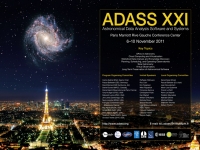Hugo Buddelmeijer (Kapteyn Astronomical Institute), Edwin Valentijn (Kapteyn Astronomical Institute)
Abstract
Exploring the large datasets produced by current astronomical surveys such as KiDS requires new visualization mechanisms that achieve the necessary scalability without losing flexibility. This paper introduces query driven visualization as a continuation of the request driven way of processing data in Astro-WISE. We explain how data is requested in a declarative way and how such a request is fulfilled in the most optimal way.
The crux of the presented research is that defining and storing a science product is separated from creating and storing the data that it represents. This allowed us to design novel mechanisms that define new science products in their most general form, but process only the part that is required for the visualization and store data only if necessary for performance reasons. The former ensures reusability of the data for future requests, preventing data duplication, while the latter ensures scalability by only spending processing power and storage space when absolutely necessary. Our mechanisms are made possible by storing science products with all the information that is required to process them. We discuss how this should be done in order to maximize the knowledge that can be obtained from the science products without inspecting the data itself.
As a result, the presented way of data handling automates most administrative tasks. The discovery of existing data and the creation of new data is done through the same process: by requesting the desired end product, which can be done from within the visualization software. New data is automatically defined in the most reusable form, and data is processed and stored in the most efficient way. This frees the visualisation software of all scalability issues and allows scientist to focus on what he or she wants to do with the data, instead of how the data is handled, leading to more science and less administration.
Poster in PDF format
Paper ID: P018
Poster Instructions
|

